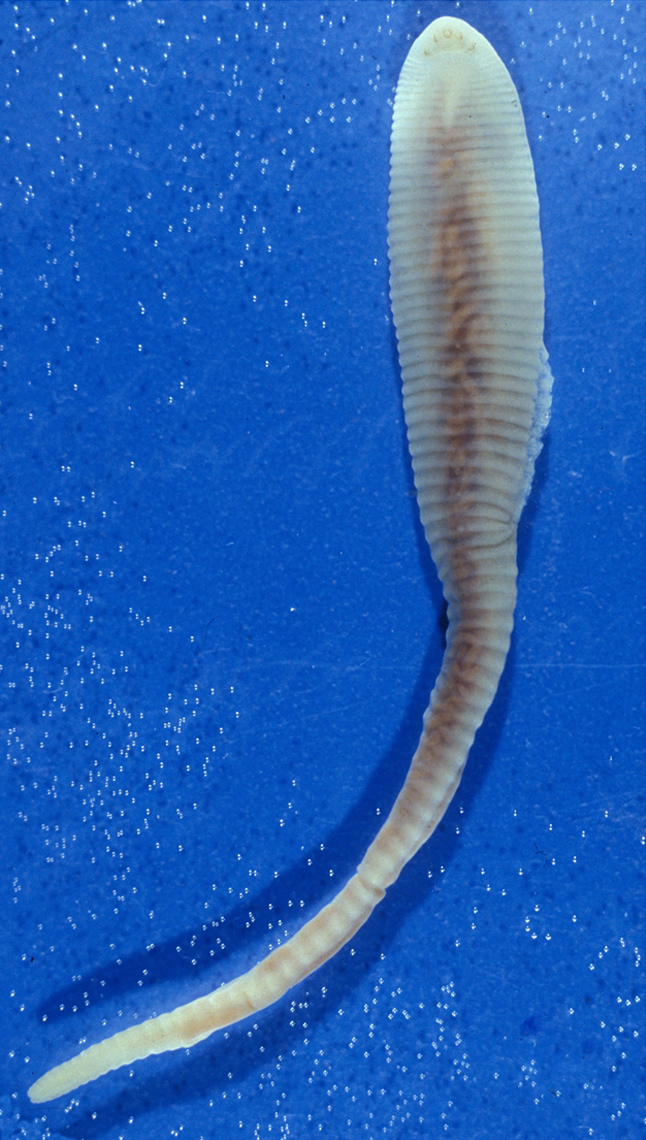Linguatulosis
Editor-In-Chief: Prab R Tumpati, MD
Obesity, Sleep & Internal medicine
Founder, WikiMD Wellnesspedia &
W8MD medical weight loss NYC and sleep center NYC
| Linguatulosis | |
|---|---|

| |
| Synonyms | N/A |
| Pronounce | N/A |
| Specialty | N/A |
| Symptoms | Cough, chest pain, nasal discharge, headache |
| Complications | Pneumonia, meningitis |
| Onset | |
| Duration | |
| Types | |
| Causes | Linguatula serrata |
| Risks | Consumption of raw or undercooked offal |
| Diagnosis | Microscopy, serology |
| Differential diagnosis | Parasitic infection |
| Prevention | Proper cooking of offal |
| Treatment | Antiparasitic drugs |
| Medication | Ivermectin, albendazole |
| Prognosis | Generally good with treatment |
| Frequency | Rare |
| Deaths | |
Linguatulosis is a rare zoonotic disease caused by parasitic arthropods belonging to the genus Pentastomida. These parasites are commonly referred to as tongue worms due to their elongated, tongue-like appearance. Linguatulosis affects both animals and humans, with humans becoming infected through the ingestion of the intermediate or definitive hosts, which include various herbivorous and carnivorous animals. The disease is of particular concern in veterinary and medical parasitology due to its zoonotic potential and the challenges it presents in diagnosis and treatment.
Etiology
The causative agents of linguatulosis are several species within the Pentastomida genus, with Linguatula serrata being the most commonly implicated in human infections. These parasites undergo an indirect life cycle involving an intermediate host, typically a herbivore such as a sheep or goat, and a definitive host, usually a carnivore like a dog or, occasionally, humans.
Transmission
Humans can acquire linguatulosis by consuming undercooked or raw meat containing the infective nymphal stages of the parasite or through direct contact with the nasal or oral secretions of infected definitive hosts. The disease is more prevalent in regions where the consumption of raw or undercooked meat is common and in areas with poor animal husbandry practices.
Clinical Manifestations
In humans, linguatulosis can present as either a visceral or nasopharyngeal form, depending on the location of the parasites. The visceral form occurs when the nymphs migrate to various organs within the body, causing symptoms such as abdominal pain, fever, and hepatomegaly. The nasopharyngeal form, also known as Halzoun syndrome, is characterized by the presence of nymphs in the nasopharyngeal region, leading to symptoms such as coughing, sneezing, and a sensation of a foreign body in the throat.
Diagnosis
Diagnosis of linguatulosis is challenging due to its nonspecific symptoms and the rarity of the disease. It is often made through the visualization of the parasites in tissue samples or secretions. Serological tests and molecular methods, such as PCR, can also aid in the diagnosis but are not widely available.
Treatment
Treatment of linguatulosis involves the removal of the parasites, which can sometimes be achieved through coughing or sneezing in cases of nasopharyngeal infection. Antiparasitic medications, such as praziquantel, have been used with varying degrees of success. Preventive measures include the proper cooking of meat and the control of definitive hosts.
Prevention
Preventive strategies for linguatulosis focus on public health education regarding the risks of consuming raw or undercooked meat and the importance of proper meat inspection and animal husbandry practices. Control of definitive hosts, particularly domestic dogs, through regular deworming and the prevention of scavenging, is also crucial.
Epidemiology
Linguatulosis has a worldwide distribution but is more common in regions where the consumption of raw or undercooked meat is a cultural practice and in areas with inadequate veterinary public health measures. The disease is considered rare in humans, but exact incidence and prevalence data are lacking due to underreporting and the challenges associated with diagnosis.
Transform your life with W8MD's budget GLP-1 injections from $125.
W8MD offers a medical weight loss program to lose weight in Philadelphia. Our physician-supervised medical weight loss provides:
- Most insurances accepted or discounted self-pay rates. We will obtain insurance prior authorizations if needed.
- Generic GLP1 weight loss injections from $125 for the starting dose.
- Also offer prescription weight loss medications including Phentermine, Qsymia, Diethylpropion, Contrave etc.
NYC weight loss doctor appointments
Start your NYC weight loss journey today at our NYC medical weight loss and Philadelphia medical weight loss clinics.
- Call 718-946-5500 to lose weight in NYC or for medical weight loss in Philadelphia 215-676-2334.
- Tags:NYC medical weight loss, Philadelphia lose weight Zepbound NYC, Budget GLP1 weight loss injections, Wegovy Philadelphia, Wegovy NYC, Philadelphia medical weight loss, Brookly weight loss and Wegovy NYC
|
WikiMD's Wellness Encyclopedia |
| Let Food Be Thy Medicine Medicine Thy Food - Hippocrates |
Medical Disclaimer: WikiMD is not a substitute for professional medical advice. The information on WikiMD is provided as an information resource only, may be incorrect, outdated or misleading, and is not to be used or relied on for any diagnostic or treatment purposes. Please consult your health care provider before making any healthcare decisions or for guidance about a specific medical condition. WikiMD expressly disclaims responsibility, and shall have no liability, for any damages, loss, injury, or liability whatsoever suffered as a result of your reliance on the information contained in this site. By visiting this site you agree to the foregoing terms and conditions, which may from time to time be changed or supplemented by WikiMD. If you do not agree to the foregoing terms and conditions, you should not enter or use this site. See full disclaimer.
Credits:Most images are courtesy of Wikimedia commons, and templates, categories Wikipedia, licensed under CC BY SA or similar.
Contributors: Prab R. Tumpati, MD

